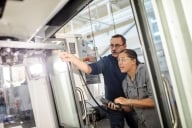You have /5 articles left.
Sign up for a free account or log in.
My husband and I got a babysitter a couple nights ago and we went for a walk around a popular Washington stated vacation destination for wealthy boaters: Roche Harbor. This resort is on the other side of San Juan Island from the Friday Harbor Marine Biology Labs, where we’re spending our summer. Walking around, we appreciated a new addition this year to the resort grounds: a series of signs indicating and annotating landmarks with historical value: “The Lime Kiln”, “The Chapel”, “The Workers’ cottages”.
From the signposts, which also had old photos, I learned that Roche Harbor was developed in the 1880’s as the site of a huge lime and cement work – a factory that quarried a huge lime deposit and denuded the hills around it of trees to fuel the lime kilns. Fifty years ago a new owner slowly began converting the property into a resort, and in the last 10 years the development has taken off so that now hundreds of million-dollar boats crowd the large marina, and each year a new layer of expensive condominiums, spas, gift boutiques, and galleries line the hill around the old kilns. Without the historical sign-posts, most visitors would probably never pause to consider Roche Harbor’s role as something other than a tourist destination.
These signposts intrigue me, as I’ve been thinking about a recently proposed theory in conservation biology termed “shifting baselines”. This is the idea that when changes occur in the environment gradually, over a long period of time (such as fish decline, pollution, or any number of examples), by the time the change is actually noticed a new generation has incorporated the change into the current idea of normal. For example, a first time diver might go into a California kelp forest and come back describing the habitat breathtaking, rich and beautiful; not an environmental problem. But he does not have the concept of the old timer whose baseline was created before all the large fish diversity disappeared. Someone time-walking from the not so distant past may view environments that I currently appreciate as unspoiled nature as hugely degraded. The environmental messes that occur in my lifetime may become the baseline for my children’s children. This is a problem in conservation biology: how can you conserve an environment when the public’s idea of what you are trying to conserve keeps changing?
Could we put up public signposts documenting environments “of old”? It is so very easy for a new generation to slide into the present perspective of a problem and wipe out the history. It’s also easy to forget “the way it was” even within a generation – gradual change makes “the way it is” ephemeral. Kids in schools are primed for helping to save the world through recycling and conserving and even reducing CO2 emissions to help global warming, but it occurs to me that kids (and adults) need inspiration from a historical context to place all this – they need interaction with enthusiasts of other generations, whose engaging histories of glories can bridge understandings of environmental wonders that will otherwise be looked over. On top of this, kids need the freedom and encouragement to make their own appreciation of their environments, in order to one day pass their own baseline down to the next generation.
I think there’s a special role for parent academics in recognizing and spreading the importance of this passing down of history. We’re ones who can appreciate the importance of earlier baselines; of documenting and writing things down; of contributing to bodies of literature and taking from the literature. At the same time, we as parents have our own very personal reminder of a changing baseline – our children, whose rapid change is stretched out over minute daily increments. A glance through old photo albums, videos, little jotted-down notes and recollections with others who know my kids since birth reminds me of how much my perspective changes without my realizing it, and how easy it is to lose those earlier baselines, and how rarely I pull myself out of the moment.





